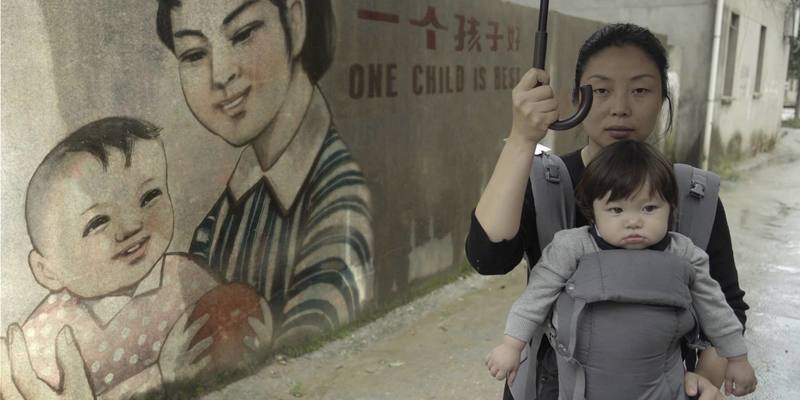One Child Nation is undoubtedly a must-see documentary. I know that this is something I often say, although I do my best not to overuse the term. However, One Child Nation is a very powerful documentary on the issue of a woman’s right to make decisions concerning her body. I cannot think of a more relevant topic right now. The documentary also discusses how silence and simple compliance can have devastating consequences not just for the present or the near future, but also for the long-term future of an entire nation. The power of this documentary is the fact that it can tell a very personal story, but also touch on themes and issues that affect all of us on a global scale.
The film follows filmmaker and first-time mother Nanfu Wang who travels back to China to see relatives. Inspired by the birth of her child, Wange decided to investigate into the untold history of China’s One-Child policy and the generations of parents and children forever shaped by this social experiment. To those who aren’t aware of the ‘One-Child Policy’, in 1979, the Chinese leader Deng Xiaoping, decided to curb the country’s looming population crisis, by initiating a mandatory one-child policy. The government went overboard in releasing propaganda (which included books for children) which pushed the agenda of the policy. The One-Child policy backfired for the nation, as there is now not enough young people to look after the elderly and replace the workforce. And, in an embarrassing turn of events, the government is now pushing for people to have two children instead of one.
The film opens with what appears to be a sleeping newborn. It isn’t until much later that we come to realize that this baby has been preserved in a jar and was in fact aborted between 8-9 months into the pregnancy. We are introduced to artist Peng Wang who has dedicated himself to remind the public of these deaths. In a shocking moment, Peng Wang explains how aborted fetuses became the subject of his work more than two decades ago after photographing a dumping site, where he noticed a dead baby discarded amid the garbage under a bridge. There are simply no words to describe this barbaric disregard for human life. Peng Wang mentions how the baby in the jar seems to be smiling despite what took place, as Wang puts it perhaps the baby smiled knowing the fact that it would never grow up in such a controlled and restricted country like China.
The more chilling realization comes when we discover that those carrying out the abortions were rewarded for their efforts, with one family planning official (a cold lady called Shuqin Jian) becoming a sort of celebrity figure and having her own propaganda video being made about her. Jian seems to speak for many of the older generations in China when she states the following “Looking back, the policy was absolutely correct. … We were fighting a population war.”
There is another midwife who seems haunted by what she was ordered to do. This was, in fact, the same midwife who delivered Wang. In the documentary, Wang returns to speak to Huaru Yuan, who is now 84 years old and trying to make amends for her past. Yuan states that she performed between 50,000 and 60,000 sterilizations and abortions. Now, she is determined to help those with infertility. In one tear-inducing moment, we see Yuan show Wang all the flags she has received from the patients she has helped, the camera following her around from one room to the next, revealing the walls covered in flags from top to bottom.
Wang challenges her own family in regards to why no-one spoke up against the part officials and allowed the forced sterilizations and abortions to happen. We learn about Wang’s childhood and upbringing, which is truly an eyeopening experience to that living in the West. Her parents wanted a son when she was born, and they gave her the name, Nanfu which means “man-pillar,” indicating that they were counting on a son to support the family. As her family lived in a less populous rural community couples were permitted to bear a second child five years after the first. Although Wang is lucky for having a brother, she was actually embarrassed by his existence growing up.
Nanfu’s parents were lucky to have a boy. However, Nanfu’s aunt and uncle were less fortunate. When she interviews her uncle, he confesses that he abandoned a baby girl shortly after her birth. This then compels Nanfu to look into the fate of her lost cousin. Then, we are introduced to the traffickers who collected unwanted babies and sold them to local orphanages. American based couple Brian Stuy and Long Lan Stuy, adopted three Chinese children under the assumption that these girls’ were orphans. It wasn’t until the Stuy’s did some digging that they undercovered a shocking and disturbing truth about the girls’ history. They have since dedicated themselves to helping Chinese orphans identify and reconnect with their parents.
There is still much I wish to discuss about One Child Nation but it would be unfair to reveal any more information about this fantastic documentary. This is definitely a strong contender for this year’s Oscar race, and deservedly so. The only criticism is the fact that there is so much being discussed here and the film has such a short runtime (of just 89 minutes) that we are left wanting more. Perhaps Wang may wish to do a follow-up documentary on the subject? This is a fearless, powerful piece that needs to be seen. Just make sure you bring tissues with you.

